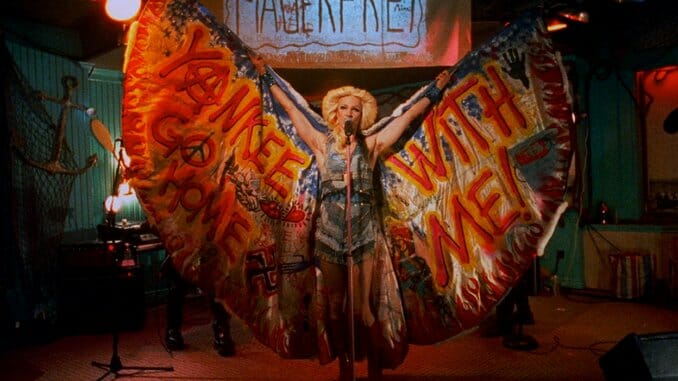Hedwig and the Angry Inch Remains a Badass, Welcoming Gateway Drug Two Decades Later

“We were the show for people that didn’t like musicals, but then realized that they did,” John Cameron Mitchell said during a reunion roundtable. He and his crew were discussing their film Hedwig and the Angry Inch, adapted from their kickass musical about an equally kickass singer (Mitchell) whose forced sex change is just the starting point on a journey of punk rock and self-discovery. Its music soars, its queerness reigns and its edgy beautiful mess is the kind of sexy salivaic rebel yell you’d do at 2 AM karaoke, directly into your friend’s mouth as they were yelling right back into yours. Hedwig and the Angry Inch, which premiered at Sundance 20 years ago in 2001, was a gateway drug for many that opened doors in a variety of ways—leading to realizations of new sexual facets, nuances of identity or just plain ol’ love of musicals. You didn’t walk away from Hedwig as the same person who came to her.
I, among other things, was one of those musical naysayers mentioned at the beginning. Well, I never explicitly said “Nay” to them, but it was never my scene. I was the punk kid by way of marching band and third-wave ska. If you’re looking for someone to blame, I’ll refer you to my parents, who would walk around the house singing The Dead Milkmen’s “Big Time Operator.” I liked the DIY grit, I liked the ridiculousness and, yes, part of me liked the inherently uncool obscurity. The point is, if you were a pop-punk band with stupidly long song titles, I was (ok, still am) all about it. Otherwise, why would I have named our band Meat Creature and the Techno Fight? Hedwig and the Angry Inch, aside from having a much better band name (referring to the “one-inch mound of flesh, where my penis used to be, where my vagina never was”), was a swirling storm of exciting elements: Anti-fascist messaging, gripping and unpretentious animation from Emily Hubley, typhoons of drag, exciting camerawork, electric performances and earworms that rocked as hard as they lingered. Even as a non-theater kid who didn’t know a showtune from a chiptune, I understood that it was badass.
In fact, in its early days, Rolling Stone’s David Fricke called Hedwig “the first rock musical that really rocks.” And you bet your ass it rocks. From the garish colors and ramshackle, dangerous live energy of “Tear Me Down”’s opening credits to the closing Queen-esque anthem rock of “Midnight Radio,” Hedwig is full of fist-pumpers and head-bangers built to jettison the wig right off your head. They were the immediate musical attraction the film held for me, but it wasn’t long after the credits rolled on my first viewing that I found myself humming the heartbreaking “The Long Grift” and the deprecatingly self-described “big breakout single” ballad “Wicked Little Town” from the film’s donut shop performance. Grabbing me with both hands and yanking me along the transparent trajectory linking glam, emo and musical theater (echoing the impact of rock opera The Black Parade on a certain modern set of listeners), these songs were equally melodramatic and welcoming. They also appealed to the rebellious peacocking instinct frequently observed in rockers, drag and everywhere in between.
-

-

-

-

-

-

-

-

-

-

-

-

-

-

-

-

-

-

-

-

-

-

-

-

-

-

-

-

-

-

-

-

-

-

-

-

-

-

-

-








































